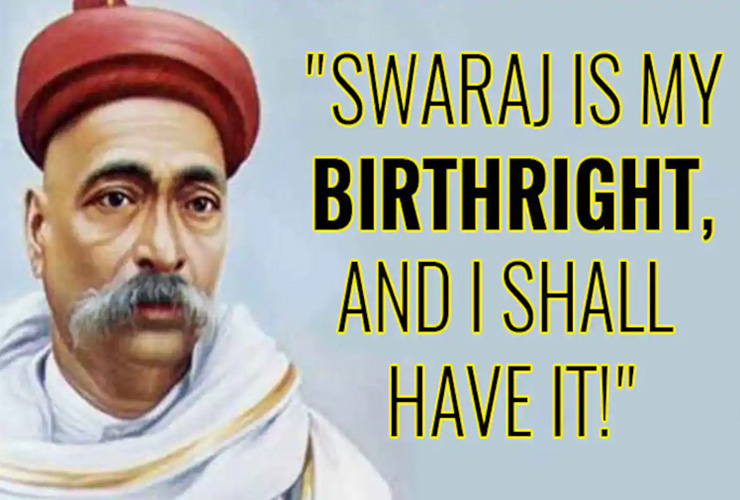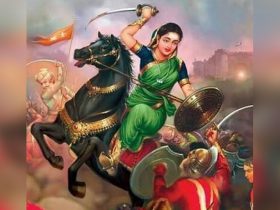“Swaraj is my birthright and I will take it” given by Lokmanya Bal Gangadhar Tilak, it was not just a slogan, but a “seed mantra” for our freedom. Indians, in the latent mind of the subjugated Hindustan, encouraged their own dignity and truth, and with the help of this, through mass movements, great men and leaders like Gandhi – Nehru, through non-violence, revolution, sacrifice and diplomacy etc. visualized the image of independent India.
* Lokmanya Bal Gangadhar Tilak was born in Ratnagiri district, Maharashtra, on 23 July 1866, in a cultured middle-class Brahmin family. Father Gangadhar was a popular teacher and scholar as well as the author of books on trigonomet ry and grammar. Which was being published at that time, and Mataji was a religious woman. Since childhood, Bal Gangadhar Tilak was very talented and combative.
* In 1876, after passing BA Honors examination from Deccan College, Tilak passed the LLB examination in 1889 from the University of Mumbai. Along with this, Tilak also took a pledge that he will not use his studies for a government job, but for public consciousness.
* For this purpose, Mr. Bal Gangadhar Tilak, together with his friends and associates such as Shri Agarkar, Shri Vishnu Shastri, Shri VS Apte, Shri MB Namjoshi, etc., in 1880, in Pune, set up a “New English School”. This in a few years came to be counted among the best schools. In 1884, the Deccan Education Society was established. Under whose auspices Fergusson College was established in 1885. Tilak, along with his colleagues, took out newspapers named “Kesari” in Marathi and “The Maratha” in English. His newspapers, with sharp sarcasm articles, started increasing popularity among the general public and the foreign ruler started to fizzle.
* From 1890, Shri Bal Gangadhar Tilak became fully active in the political and freedom movement and joined the Congress. Bang-Bhang was strongly opposed by Tilak. Lala Lajpat Rai from Punjab, Bal Gangadhar Tilak from Maharashtra, Vipin Chandra Pal from Bengal, represented the Congress’s Garam Dal. In 1908, Prafulla Chaki and Khudiram Bose supported the attack. As a result, Tilak was sent to Mandalay jail in Burma.
* Tilak gave direction to the public awareness and the then Congress with many fundamental ideas. Boycott of foreign goods, importance of Swadeshi, pride of Indianness, Satyagraha etc. Which Gandhiji developed as movements.
* Tilak formed the Indian Homeland League in Lucknow, in 1916, together with Annie Besant and Jinnah, for Hindu-Muslim unity. Tilak’s vision was amazing. For example, Tilak raised Swaraj’s demand in 1897, and the Congress passed it in 1929. Secondly in 1918, when Tilak went to England, he realized that the Labor Party was the emerging party there. Tilak established good relations with its leaders and influenced them, through India’s favor, and Indian ancient scholarship, etc. And we all know that in 1947, when India became independent, in England, the Labor Party He was in power.
* Gandhiji called Tilak the creator of modern India and Nehru gave Tilak the title of the father of Indian revolution. Lokmanya Bal Gangadhar Tilak, a measure of the penetration and popularity in the public, seems to be comfortable with the fact that on 1 August 1920, at his death, about 200,000 people attended the funeral at that time.
* Lokmanya Bal Gangadhar Tilak inspired two festivals like “Ganeshotsav and Shivaji Mahotsav” to be celebrated loudly, with a view to instilling confidence in the masses and to test their own strength. Through these celebrations also, indirectly, in the freedom movements, the general public expressed their power and participation.
* Lokmanya Tilak’s irrefutable reasoning, in his advocacy profession, was exposed many times. Nevertheless, two notable cases are added with the name of Tilak. When the foreign ruler and the conspirator, together, tried to humiliate Tilak. One of them is “Bapat Case” and the other is “Tai-Maharaj Case”. Rich in qualities like endurance, intelligence, laboriousness and factual reasoning, Tilak proved himself innocent in both the cases, having achieved Kundan, nostalgia, tightening this criterion.
* Apart from all this, Tilak was a great academic, professor of mathematics and science, as well as a Sanskrit scholar. As a result of his research on the Vedas, relating to time determination, Bal Gangadhar Tilak wrote an essay on the antiquity of the Vedas based on the evidence of mathematics and astrological observation. Sent a summary of the essay to the “International Congress of Orientalists”, taking place in London, in 1892. The following year he published this essay in book form, under the title “The Orion – The Research in to the antiquity of Vedas”.
* About this book, oriental scholar “Dr. Bloomfield” expressed his views, in some way.”The author (Tilak) informs meekly that the Rigveda’s composition period cannot be less than 4000 years before the birth of Christ. With the Hindu tradition, its period must be 6000 years before Christ. Considering the tendency of the Hindus to accept anything, about the abundant imaginations, I thought that some pages of this book, reversed, would set it apart with a smile. But only a few times my smile vanished and I felt that something extraordinary had happened. At first I was impressed by the author’s fact that he had done a serious study of Vedic literature and Western literature related to the subject. My superficial study turned into a serious study. Instead of a sense of derision, I began to get convinced by the author’s words. This book is a sensationalist in the field of literature. It will take long time to understand the results of Tilak’s discovery- Doctor Bloomfield! ”
* Apart from Doctor Bloomfield, many other scholars such as Max Müller, Weber, Jacoby, Witney etc. also acknowledged Tilak’s scholarship and originality.
* Tilak propounded in the Bhagavad Gita mystery that, from this book, it gives the message that one should do selfless service to humanity.
* Lokmanya Bal Gangadhar Tilak, who is known by the proclamation of “Swaraj is my birthright and I will take it”, is known more as a common man, a great freedom fighter. Whereas today there is a need that our generation needs to have some knowledge about the great freedom fighters, other unique qualities and activities so that we can understand how, even under the most adverse circumstances, these great men contributed positively, “to their culture and to their society and nation”.
* Inspired by all these things, full of various qualities and endowed with global facilities, even today’s generation, by fighting the evils prevailing in the society, can build a capable, advanced nation.
* This will be our true tribute to our freedom fighters.












Leave a Reply